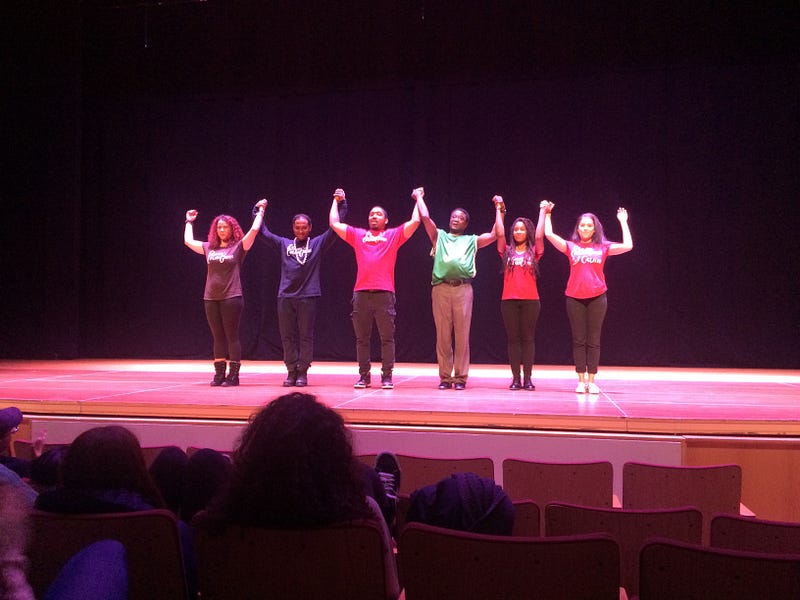
A couple of chairs, six actors, and a stage. Coming from Brooklyn, New York, Between the Lines Productions traveled to the Hill to share their talents in a showing of
Platanos y Collard Greens
, a romantic comedy which explores the relations between African-Americans and Latinx individuals. In a mixture of light-hearted jokes and serious moments of introspection,
Platanos y Collard Greens
was a thought-provoking story played out by passionate actors, made to make people laugh and think.
Written by author David Lamb in 2003, the play was actually based on Lamb’s novel
Do Platanos Go Wit’Collard Greens?
produced nine years prior. The play has since been performed a countless number of times by a number of production companies. Students of the Hamilton community had the opportunity to view the play as well, thanks to the showing hosted by The Black and Latinx Student Union in cooperation with the Theatre Department, Africana Studies Department, Days-Massolo Center, First-Year Experience, and Student Assembly.
The story focuses on the lives of two college students, including Freeman, an African-American man with his sights set on Angelita, a Latina woman who gradually follows along with his advances. Though the two have mutual feelings for one another, Angelita’s mother disapproves of their relationship because “she doesn’t want [her] dating any black guys,” a sentiment Angelita expresses to Freeman disappointingly. The conflict between following her mother’s expectations opposed to her individual desires acts as a major theme in the play and drives the story, emphasizing the issues that people of color may have within their own communities.
Alongside these two main characters, OK plays the role of Freeman’s best friend who constantly attempts to be sly and a ladies’ man. As a parallel, ‘Nilsa, a confident and high-energy girl, is Angelita’s best friend. While both are seen as comedic relief characters with their brief yet amusing side commentary and constant enthusiasm, they emphasize the play’s sense of satire, especially as OK and ‘Nilsa fulfill stereotypes typically associated with people of color but are still seen as comedic riots.
Pops is a supporting character who acts as Freeman’s father, giving extremely relevant advice to Freeman in a nurturing and endearing manner, which can be attributed to the actor’s ability to show both giddy and serious moments. The character of Malady is also involved in the storyline, acting as Freeman’s running mate while Freeman campaigns for student government. While she is a strong and defiant woman, especially when conversing with Freeman, she also alludes to notions of following society’s expectations of her, including when it comes to how she should style her hair at her workplace.
As a result, by addressing topics of how one should dress and look in addition to how one should speak or behave,
Platanos y Collard Greens
speaks to more than just a complicated college relationship.
The piece addresses the constant stereotyping, prejudice, and racial biases held against people of color as not only seen in the history of the United States, but the present day as well. As emphasized in the play, racism was a problem of the past, but it is also a problem of the present and is very much ongoing and alive.
The importance and relevancy of the play’s message is especially seen with the implementation of spoken poetry in between dialogues, which is atypical from most modern shows. Throughout the play, the actors relay poems focused on the reality of today. In fact, Angelita mentions near the end of the play, “These monsters are far too real and far too scary and they don’t live under my bed — they live in the White House and on Capitol Hill.” She alludes to the behaviors of both the government and people in general that seek to dismantle the worth of people of color. Similarly, other characters make references to the killings of black men by police forces such as Trayvon Martin, Philando Castile, and Alton Sterling, among others.
Most importantly, the play sheds light onto the intricate complexities seen in race relations, not only within society as a whole but also within communities with people of color. Though the play is not overtly political, especially with its inclusion of witty jokes and comedic behavior,
Platanos y Collard Greens
is a unique way for audience members to understand the need for unity in the current day among all people.

























